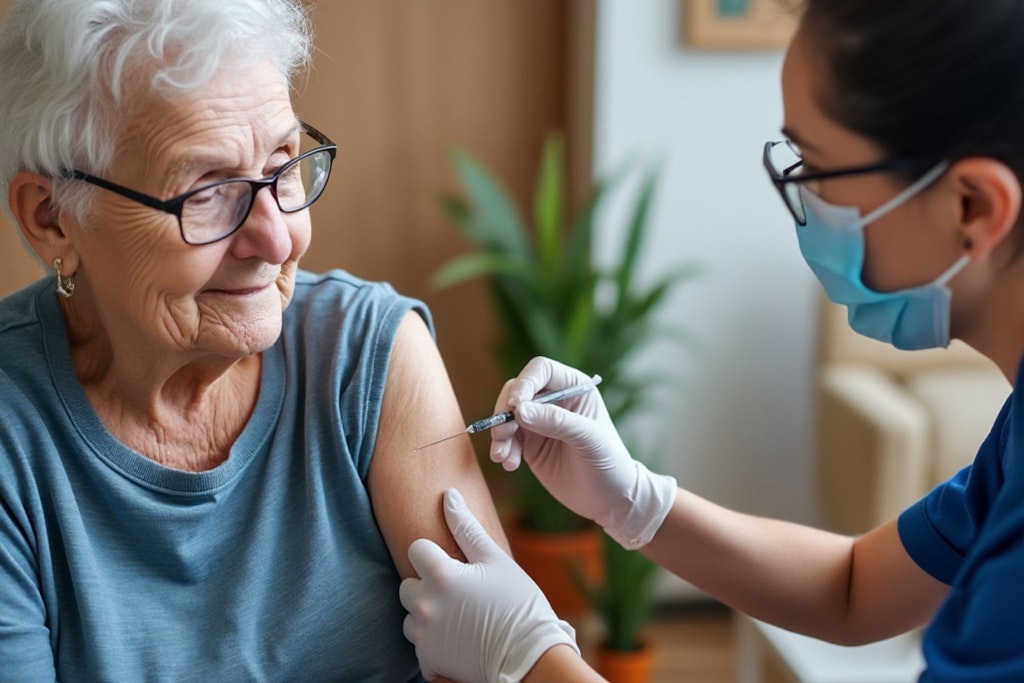Gov says providers must ‘act now’ over low COVID-19 vaccination rates
Last updated on 5 December 2024

Residential aged care providers are being called upon by the Australian Government to address low COVID-19 vaccination rates ahead of the festive season.
The Department of Health and Aged Care recently sent out a signed joint letter to providers to reinforce their responsibility for facilitating timely access to vaccinations for their residents. It was signed by Ageing and Aged Care Group Deputy Secretary Michael Lye and Chief Nursing and Midwifery Officer Professor Alison McMillan PSM.
The letter emphasised that additional steps to protect residents should be taken now as COVID-19 cases are expected to rise during the summer months.
“Older age is still the biggest risk factor for severe COVID-19. Over the festive season there will be an increase in travel and visits from family and friends to your homes. This often leads to a rise in COVID-19 cases amongst staff and residents,” the letter said.
“It is important to take steps to protect those in your care. Regular COVID-19 vaccinations help to prevent serious illness and unnecessary hospitalisations among aged care residents. Vaccination rates are low so we need to act now.
“Residential aged care homes are responsible for facilitating timely access to vaccinations for their residents. You should be having discussions with residents, their families and loved ones promoting the benefits of receiving regular COVID-19 vaccinations.”
Current COVID-19 stats for aged care
- As of November 14, there are 1,359 active COVID-19 cases and 196 active outbreaks in residential aged care homes (including staff and residents)
- 19 COVID-19-related deaths have been recorded in November so far, taking the cumulative total to 7,127 since the beginning of the pandemic
- The number of resident cases has increased by 64% in the last two weeks with Victoria, New South Wales and Western Australia seeing the largest increase
While there has been a decrease year on year for the rate of case fatality in residential aged care from 33% in 2020 to 1.8% in 2024, resident deaths now outpace community deaths.
The overall rate for resident deaths is similar with COVID-19 recorded as the cause of death in 1.9% of all deaths in permanent residents throughout 2024.
The current spike in cases is lower than the equivalent period from 2023 when there were over 2,000 active cases in residential aged care. This November peak held steady throughout December with 2,278 active cases recorded the week before Christmas before it peaked with 3,195 active cases in late January 2024.
Vaccination rate stats
- As of 13 November 2024, 72.8% of aged care residents have received a booster dose in the last 12 months
- For residents over the age of 75, 89,401 (53.8%) aged care residents received a booster dose in the last 6 months
- 7,929 aged care residents have received a vaccination in the last 28 days (compared to 8,807 in the 28 days prior).
These statistics show a significant improvement from mid-year results when just 61% of residents had received a booster dose in the previous 12 months and only 38% of those aged 75 and over had received one within six months.
As per the government’s letter and official advice, people aged 65 and over should receive a COVID-19 booster every 12 months, or every six months for those aged 75 and over or adults with severe immunocompromise.
The government said providers should start planning 2025 vaccination clinics before next winter to give residents the ‘best protection during the winter months’.
“It is recommended that all aged care homes hold a vaccination clinic at least every 6 months to ensure residents receive timely COVID-19 vaccinations and annually for influenza vaccinations. Administering COVID-19 and flu vaccines at the same time is safe, improves uptake of each vaccine and increases protection against both diseases,” the letter added.